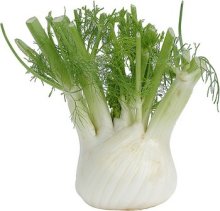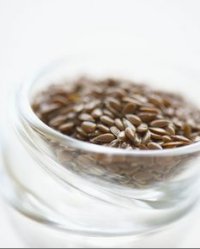Fennel: The Uses and Nutrition Facts of This Delicious Antioxidant, Vitamin C Powerhouse Vegetable
by www.SixWise.com
Now is a perfect time to add some fennel -- the crunchy,
subtly licorice-flavored veggie -- to your springtime menus,
as its prime season is just wrapping up. If you've never tried
fennel, you've surely noticed it, as its shape is unlike any
other vegetable.
|

Fennel has a texture similar to celery with a somewhat
sweet, licorice-like flavor (that gets a bit nuttier
when it's roasted).
|
Fennel has a pale green bulb from which celery-like stalks
tipped with feathery leaves grow. Every part of the plant,
from the bulb to the seeds, is edible and quite delicious,
but the best reasons to use fennel in your cooking are hidden
beneath its surface.
Four Healthy Reasons to Eat Fennel
Fennel is full of beneficial nutrients including vitamin
C, fiber, potassium, manganese, folate, niacin, phosphorous,
calcium, magnesium, iron, and copper. It also provides these
other good-for-you benefits:
-
Amazing Phytonutrients: The phytonutrients in
fennel -- rutin, quercitin, anethole and more -- have
been found to reduce inflammation, help prevent cancer
and protect animal livers from damage caused by chemicals.
-
Antioxidant Protection: The fennel bulb is loaded
with vitamin C, an antioxidant
that helps protect your body from free
radical damage, is antimicrobial and helps keep your
immune system functioning effectively.
-
Fiber: Fennel is a good source of fiber,
which may help to reduce cholesterol levels and remove
cancer-causing toxins from your colon.
-
Folate: Fennel is also a good source of folate,
a B vitamin that helps convert the dangerous homocysteine
molecule (which can increase your risk of heart attack
or stroke) into a harmless compound.
Fennel Has Been Enjoyed Since Ancient Times
Today fennel is usually associated with Italian foods and
is cultivated in the United States, France, India (where it's
used as an after-dinner breath freshener and digestive aid)
and Russia, but in ancient times it was grown in Europe, the
Mediterranean and the Far East.
|

Fennel seeds make a rich addition to soups, salads,
stews and sauces.
|
The Greeks called fennel "marathron," because it
grew on the battlefield of the same name, and revered it for
its medicinal and mythic purposes. Meanwhile, in medieval
times, fennel was used to ward off witchcraft and evil, and
in Puritan times fennel seeds were called "meeting seeds,"
and were chewed during gatherings.
How to Use Fennel
The bulb, stalks and leaves of fennel can all be used in
cooking, and it's simple to prepare. Simply cut the stalks
from the bulb, remove the leaves and chop into the size you
need. The bulb and stalks make an excellent side dish sautéed
with onions, or they can be added to soups, stews and even
used raw on sandwiches and salads. Fennel leaves work best
as a seasoning for fish, plain yogurt, soups and stews.
If you've never tried fennel before, or if you've been looking
for a new fennel dish, the following recipes are simple to
prepare and hard to resist!
Roasted Fennel
Ingredients:
- 2 fennel bulbs, stalks cut off, bulbs sliced
- Olive oil
- Balsamic vinegar
Method:
- Preheat oven to 400°F.
- Rub just enough olive oil over the fennel to coat. Sprinkle
on some balsamic vinegar, also to coat.
- Line baking dish with silpat or aluminum foil and lay
out pieces of fennel
- Roast for 15-20 minutes, until the fennel is cooked through
and beginning to caramelize.
Shaved Fennel Salad
Ingredients:
- 1 fennel bulb, shaved paper thin with a mandoline or meat
slicer
- 2 Tbsp extra virgin olive oil
- 1 Tbsp fresh lemon juice
- 1/8 teaspoon of chopped fresh thyme leaves
- 1 Tbsp chopped flat-leafed parsley
- 2 Tbsp shaved Parmesan cheese
Method:
- Mix all ingredients together and serve.
Recommended Reading
14
Fruits and Vegetables That Provide the Best Protection Against
Arthritis
Nine
Uncommon "Green Leafy Vegetables" Worth Trying
Sources
The World's
Healthiest Foods
Simply
Recipes